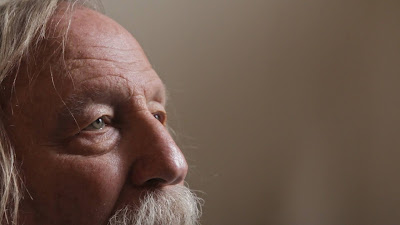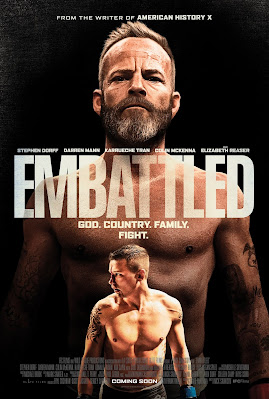Ms. Oberli (the filmmaker is pictured below) is dealing with "class" here: the
wealthy and those who must work (and work and work) to earn their living. And while many of the expected tropes do show up, the movie's richer and more inclusive than you'll expect. Characters expand, and the very change they resist also allows them to grow.The plot kicks off with the arrival at the local bus station of the eponymous care-giver, Wanda, a Polish woman who is returning to the lakeside home of a wealthy Swiss family to care for the aging father who has suffered a stroke. Why Wanda left in the first place is never baldly stated (the care-giver who replaced her did not work out) but once we get a load of the family itself -- elitist father, cheapskate mother, nasty sister and weakling brother -- it's not difficult to imagine myriad reasons for her departure.
The smart and serious Wanda is played by Polish actress Agnieszka Grochowska (above, right, with her charge, played by André Jung), and this character is both active and reactive in terms of setting the plot in motion. What happens involves and is due to the actions of all the characters, so much so that any blame you're ready to portion out soon becomes beside the point.
Marvelous Marthe Keller (above) handles the role of the mother with expected aplomb, and the weak son is given a careful, caring reading by Jacob Matschenz (below, left). The standout performance, however, comes from the actress who plays the sister: Birgit Minichmayr (center left, below), whom you may remember from the terrific film, Everyone Else. Ms Minichmayr runs the gamut here, and she takes us with her all the way home.
By its finale, My Wonderful Wanda might even qualify as a feel-good film, but as my spouse pointed out, there's an awful lot of sadness here, too. It is also the kind of movie that Hollywood -- even American independent cinema – rarely gives us. In so many ways, it's simply more adult, offering an idea of life in all its messiness, rather than pre-digested pablum. Films like this are the reason why TrustMovies began seeking out foreign-language movies back in the 1960s. And why he's still doing that.
From Zeitgeist Films and Kino Lorber, the movie -- in German with English subtitles and running 111 minutes -- opens in a limited run nationwide in theaters (both virtual and real) this Friday, April 23. Click here then scroll down to see all listed cinemas, along with more information on the film.



























































